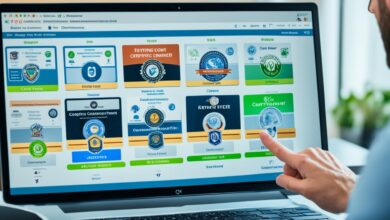Exploring Leadership and Management Essentials

Have you ever wondered what sets great leaders apart? What are the key skills and qualities that make them effective in driving organizational success? In this article, we will delve into the world of leadership and management, uncovering the essential principles and practices that can transform individuals into impactful leaders.
Leadership and management are not just about holding a title or position of authority. They require a unique set of skills, ranging from effective communication and decision-making to strategic thinking and people management. By understanding and mastering these essentials, leaders can inspire their teams, navigate challenges, and achieve extraordinary results.
In this comprehensive guide, we will explore the crucial components of leadership and management. We will discuss the foundational leadership skills, delve into different leadership styles and strategies, and explore the techniques of effective management. Get ready to unlock the secrets of effective leadership and elevate your professional journey!
Key Takeaways:
- Effective leadership goes beyond a position of authority and requires a unique set of skills and qualities.
- Leadership skills include effective communication, strategic thinking, and people management.
- Understanding different leadership styles and strategies can enhance leadership effectiveness.
- Effective management techniques are crucial for driving organizational success.
- By mastering leadership and management essentials, individuals can become impactful leaders.
The Purpose and Benefits of Leadership Programs
Leadership programs play a crucial role in developing new or emerging leaders. These programs are designed to provide individuals with a solid foundation in leadership principles, effective business practices, and essential people management skills. By participating in a leadership program, individuals can enhance their ability to lead teams effectively, make strategic decisions, and inspire others to achieve their full potential.
Leadership development is a continuous process that enables individuals to constantly refine their leadership capabilities and adapt to evolving business landscapes. Leadership programs offer a structured learning environment where participants can gain valuable insights from experienced leaders and industry experts. They provide a comprehensive curriculum that covers a wide range of topics, including leadership theories, communication strategies, problem-solving techniques, and change management.
One of the key benefits of leadership programs is the opportunity to develop and strengthen leadership competencies. Through interactive workshops, case studies, and simulations, participants can enhance their decision-making skills, learn to effectively manage conflicts, and develop their own unique leadership style. These programs also provide a platform for individuals to network with like-minded professionals, fostering collaboration and the exchange of best practices.
Completing a leadership program can have a profound impact on an individual’s professional growth and career trajectory. By gaining a deeper understanding of leadership principles and enhancing their leadership skills, participants position themselves as strong candidates for future leadership roles within their organizations. Leadership programs also provide individuals with a competitive edge in the job market, making them highly sought after by employers who value effective leadership and management capabilities.
Furthermore, leadership programs often offer the opportunity to earn valuable continuing education units (CEUs). These CEUs can contribute to professional certifications and demonstrate a commitment to ongoing professional development. They also showcase a dedication to staying abreast of the latest industry trends and best practices in leadership and management.
Overall, leadership programs are instrumental in shaping the next generation of leaders. By providing individuals with the necessary knowledge, skills, and tools, these programs empower participants to lead with confidence, drive organizational success, and positively impact their teams and stakeholders.
Leadership programs offer a structured learning environment where participants can gain valuable insights from experienced leaders and industry experts.
Key Benefits of Leadership Programs:
- Enhanced leadership competencies
- Increased confidence in leadership abilities
- Opportunity to earn valuable continuing education units (CEUs)
- Development of unique leadership style
- Networking opportunities with like-minded professionals
- Improved decision-making and problem-solving skills
- Preparation for future leadership roles
- Competitive advantage in the job market
Leadership Essentials Course
The Leadership Essentials course is a comprehensive program designed to equip individuals with the necessary skills and knowledge to excel in leadership roles. Through this course, participants will gain a deep understanding of the fundamental principles and practices of effective leadership.
Coaching Styles
One of the key aspects covered in the Leadership Essentials course is coaching styles. Participants will explore different approaches to coaching and learn how to tailor their coaching style to meet the needs of their team members. By mastering various coaching styles, leaders can effectively guide and support their team to achieve optimal performance.
Interpersonal Skills
Interpersonal skills play a crucial role in leadership success. In this course, participants will develop the necessary interpersonal skills to build strong relationships, communicate effectively, and inspire their team members. These skills enable leaders to foster a positive and collaborative work environment, resulting in improved team performance.
Leadership Competencies
The Leadership Essentials course also focuses on developing key leadership competencies. Participants will explore essential competencies such as strategic thinking, emotional intelligence, and resilience. By honing these competencies, leaders can navigate complex challenges, adapt to change, and inspire their teams to achieve organizational goals.
Change Management
An integral part of effective leadership is the ability to manage change. Leaders need to guide their teams through periods of transition and ensure smooth implementation of new initiatives. Through the Leadership Essentials course, participants will learn proven strategies and techniques for managing change effectively, fostering a culture of adaptability and innovation within their organizations.
Problem-Solving and Decision-Making
The course emphasizes the importance of problem-solving and decision-making skills in leadership. Participants will gain practical tools and frameworks to analyze complex problems, identify innovative solutions, and make informed decisions. These skills empower leaders to navigate challenges and drive organizational success.
Vision and Strategy
Vision and strategy are critical elements of effective leadership. The Leadership Essentials course equips participants with the knowledge and skills to create a compelling vision and develop strategic plans to achieve organizational objectives. By setting a clear direction and guiding their teams towards it, leaders can inspire and motivate their members to excel.
Work Management
Effective work management is vital for leaders to optimize productivity and achieve desired outcomes. The course provides strategies and techniques for effectively managing resources, prioritizing tasks, and delegating responsibilities. Leaders will learn how to create an efficient work environment that maximizes efficiency and fosters employee growth.
In the Leadership Essentials course, participants will not only gain theoretical knowledge but also have opportunities to apply their learning through practical exercises, case studies, and interactive discussions. The course is taught by experienced instructors who possess in-depth expertise in leadership principles and have a track record of successfully guiding individuals towards leadership excellence.
By completing the Leadership Essentials course, individuals will develop a strong foundation in leadership essentials and be well-equipped to lead with confidence, inspire their teams, and drive positive change within their organizations.
Business Fundamentals Course
The Business Fundamentals course is a comprehensive program designed to equip individuals with the essential skills needed to thrive in the dynamic business world. By enrolling in this course, participants have the opportunity to develop a strong foundation in various key areas, ranging from effective business communication to decision-making skills and workforce culture. Led by our expert instructor in business communication and leadership, this course provides invaluable insights and strategies for professional growth and success.
Business fundamentals form the bedrock of a successful career in any industry. Through interactive sessions and practical exercises, participants will gain a deep understanding of the core principles that drive business operations. This knowledge will enable them to make well-informed decisions, contribute to a positive workforce culture, and effectively communicate within the business environment.
The course places a strong emphasis on business communication as a critical skill for success. Participants will learn strategies to enhance their verbal and written communication skills, enabling them to convey ideas clearly, engage with colleagues and stakeholders, and effectively negotiate and influence others.
Effective communication is the cornerstone of successful business interactions. It fosters understanding, collaboration, and the building of strong relationships. Whether it’s conveying a compelling presentation or having a productive conversation, effective business communication is essential in achieving professional objectives.
Additionally, the course explores decision-making skills and techniques that are vital for navigating complex business scenarios. Participants will learn how to analyze data, evaluate risks, and make informed decisions that align with organizational goals. The ability to make sound decisions in a fast-paced business environment is a valuable asset that sets professionals apart.
A positive workforce culture is essential for fostering engagement, productivity, and innovation within an organization. In our Business Fundamentals course, participants will uncover the importance of creating a supportive and inclusive work environment. They will gain insights into fostering collaboration, managing diversity, and nurturing a culture that celebrates creativity and continuous improvement.
Furthermore, effective speaking and presentation skills are crucial for professionals looking to make an impact in the business world. Through practical exercises and expert guidance, participants will develop techniques for engaging presentations, persuasive pitches, and influential public speaking. These skills will empower individuals to effectively communicate their ideas, inspire others, and confidently represent their organizations.
The Business Fundamentals course equips participants with the knowledge and skills necessary to thrive in today’s competitive business landscape. By mastering business fundamentals, participants will be better prepared to navigate challenges, seize opportunities, and contribute to the success of their organizations.
People Management Course
In today’s dynamic business environment, effective people management is key to achieving organizational success. The People Management course offers comprehensive training in various aspects of managing employees, enabling participants to develop essential skills and strategies for creating a positive work culture and maximizing team performance.
One of the critical components covered in this course is onboarding and training, which focuses on the successful integration of new hires into the organization. Participants will learn best practices for designing and implementing an effective onboarding program, ensuring that new employees feel welcomed, supported, and prepared to make valuable contributions.
Creating a supportive onboarding experience can significantly impact employee engagement and retention. Through this course, participants will gain insights into onboarding strategies that foster strong connections and help new employees thrive from day one.
Another key area of focus in the People Management course is performance management. Participants will explore techniques for setting clear goals, providing constructive feedback, and facilitating ongoing performance discussions. By mastering performance management, managers can strengthen employee engagement, improve productivity, and drive overall organizational performance.
The course also dedicates significant attention to conflict resolution strategies, equipping participants with the necessary tools to address and resolve workplace conflicts effectively. Conflict resolution skills are crucial for maintaining a harmonious work environment and fostering positive relationships among team members.
- Key topics covered in the People Management course:
- Onboarding and training
- Performance management
- Conflict resolution
- Performance evaluations
- Disciplinary actions
- Terminations
Furthermore, participants will gain insights into conducting fair and objective performance evaluations and implementing appropriate disciplinary actions when necessary. Understanding the importance of fair performance evaluations and disciplinary actions is crucial for maintaining consistency, objectivity, and accountability within the organization.
Lastly, the People Management course explores the intricacies of lawfully conducting terminations and offboarding processes. Participants will learn the legal considerations and best practices for handling terminations, ensuring compliance with labor laws and mitigating potential risks.
Upon completion of the People Management course, participants will be equipped with the knowledge and skills needed to navigate the complexities of managing people effectively. The course provides a solid foundation for addressing key challenges and implementing strategies that drive employee engagement, productivity, and team success.
A Sample Module from the People Management Course: Conflict Resolution Strategies
The module on Conflict Resolution Strategies explores various methods and techniques for managing workplace conflicts. Participants will learn how to identify the underlying causes of conflicts, effectively communicate and negotiate, and facilitate win-win resolutions that promote collaboration and harmony. This module emphasizes the importance of active listening, empathy, and collaborative problem-solving in resolving conflicts and maintaining positive working relationships.
Conflict Resolution Strategies Module Outline:
| Module | Topics Covered |
|---|---|
| 1 | Understanding workplace conflicts and their impact |
| 2 | Identifying the underlying causes of conflicts |
| 3 | Effective communication and active listening |
| 4 | Collaborative problem-solving techniques |
| 5 | Negotiation and compromise |
| 6 | Mediation and conflict resolution processes |
Workshop
Enhancing work processes and team communication are key elements of promoting a positive work environment. The Workshop provides participants with a hands-on and interactive session to develop essential skills for effective interpersonal and team communication, as well as techniques for conflict resolution. Through this workshop, individuals can identify strategies to optimize work processes and foster a more collaborative and productive work environment.
The workshop will be led by an expert instructor who specializes in group dynamics, interpersonal relationships, and leadership. With their guidance, participants will gain valuable insights into effective communication practices that can strengthen team dynamics and overall work performance.
The goal of this workshop is to empower individuals with the knowledge and tools needed to navigate and resolve conflicts in a constructive manner. By establishing effective communication channels and fostering a positive work environment, teams can enhance their productivity and achieve better results.
Benefits of the Workshop:
- Enhanced work processes
- Improved team communication
- Increased interpersonal communication skills
- Practical conflict resolution techniques
- Promotion of a positive and productive work environment
“The Workshop was a transformative experience that allowed me to hone my communication skills and learn how to resolve conflicts in a constructive manner. The interactive sessions and practical exercises provided invaluable insights that I can apply in my daily work life.” – Anna Johnson, Workshop participant
Participating in the Workshop offers individuals the opportunity to develop the skills necessary for effective communication and conflict resolution. By implementing strategies learned during this workshop, teams can create a positive work environment that fosters collaboration, innovation, and success.
Design, Direct, and Shape Organizational Processes
Effective leaders and managers possess the ability to design, direct, and shape organizational processes to achieve desired outcomes. By understanding the decision-making process, implementing effective project management strategies, and spearheading learning initiatives, leaders can drive continuous improvement and innovation within their organizations.
One fundamental aspect of designing organizational processes is the decision-making process. Leaders must have a deep understanding of the factors involved in decision-making to make informed choices that align with the organization’s goals and values.
Organizational processes also require effective project management skills. Leaders need to be adept at planning, organizing, and executing projects to ensure they are completed on time and within budget. Through efficient project management, leaders can effectively allocate resources and monitor progress, ensuring successful outcomes.
Furthermore, leaders play a critical role in spearheading learning initiatives. By prioritizing continuous learning and development, organizations can foster a culture of growth and adaptability. Effective leaders identify opportunities for improvement, encourage knowledge sharing, and promote ongoing skill development.
| Skills | Role |
|---|---|
| Decision-making | Understanding the decision-making process and making informed choices |
| Project management | Planning, organizing, and executing projects to ensure successful outcomes |
| Learning initiatives | Prioritizing continuous learning and development to foster growth and adaptability |
Effective leaders have the ability to navigate change and manage organizational processes to drive success. By mastering decision-making, project management, and learning initiatives, leaders create an environment that fosters continuous improvement and innovation, leading to organizational growth and prosperity.
Change Management: Leading through Transformation
Leadership also involves managing and leading change within an organization. Change management is vital in helping teams adapt to new circumstances, embrace innovation, and overcome resistance.
When implementing changes, leaders need to communicate the reasons behind the change, articulate a clear vision, and engage employees in the process. By involving teams in the change management process, leaders build trust, alleviate resistance, and increase the likelihood of successful implementation.
Effective leaders provide guidance and support during periods of change, fostering a sense of stability and confidence among employees. They understand that change can be challenging, and therefore, they actively listen, provide resources, and address concerns to facilitate a smooth transition.
Change management is an ongoing process as organizations continuously evolve to remain competitive. Leaders who excel in change management not only adapt quickly themselves but also inspire and enable others to embrace change and drive organizational success.
- Clear communication
- Articulating a vision
- Engaging employees in the change process
- Providing guidance and support
- Addressing concerns and facilitating a smooth transition
Developing Leadership Skills for Success
Leadership skills are integral to achieving success, both personally and professionally. Developing these skills requires a combination of personal mastery, effective relationships, and change resilience.
Personal mastery is the process of continuous self-improvement and self-awareness. By honing your leadership skills, you can enhance your decision-making abilities, understand your strengths and weaknesses, and continuously strive for growth.
Building effective relationships is another crucial aspect of leadership. Leaders who can forge strong connections with their team members and stakeholders create an environment of trust, collaboration, and loyalty. These relationships are essential for fostering teamwork, innovation, and achieving organizational goals.
Change resilience is the ability to adapt and lead in the face of uncertainty and change. In today’s dynamic business landscape, leaders must be agile and resilient to navigate challenges, inspire their teams, and drive positive outcomes. By embracing change and proactively managing it, leaders can guide their organizations towards success.
“Leadership is not about being in charge. It is about taking care of those in your charge.” – Simon Sinek
To develop these leadership skills and achieve success, it is essential to invest in continuous learning and development. Leadership programs, such as the ones offered by the American Management Association, provide valuable insights, practical techniques, and real-world case studies to enhance your leadership capabilities.
By focusing on personal mastery, building effective relationships, and cultivating change resilience, individuals can become more effective leaders, reach their full potential, and drive success in all areas of life.
| Leadership Skills | Personal Mastery | Effective Relationships | Change Resilience |
|---|---|---|---|
| Definition | The continuous process of self-improvement and self-awareness | Building strong connections and trust with team members and stakeholders | The ability to adapt and lead in the face of uncertainty and change |
| Benefits | Enhanced decision-making abilities, self-awareness, and growth | Collaboration, loyalty, and teamwork | Agility, resilience, and positive outcomes |
| Keys to Development | Continuous learning, self-reflection, and skill-building | Effective communication, empathy, and trust-building | Embracing change, adaptability, and proactive management |
The Impact of Leadership on Business Performance
Effective leadership plays a vital role in driving business performance. Organizations with strong leaders are better equipped to navigate the complexities of today’s dynamic business landscape and achieve sustainable growth. In this section, we will explore the profound impact leadership has on key business outcomes, including talent acquisition and retention, strategy execution, and overall business performance.
The Relationship Between Leadership and Talent Acquisition and Retention
A primary area influenced by leadership is talent acquisition and retention. Engaging and retaining top talent is essential for building high-performing teams and driving organizational success. Effective leaders create a compelling vision, foster a positive work culture, and provide clear guidance and support to their teams. They develop strong relationships with their employees, promoting engagement, loyalty, and job satisfaction. Consequently, organizations led by exceptional leaders attract and retain talented individuals who are motivated to contribute their best and grow alongside the company.
Leadership’s Role in Strategy Execution
Leadership is also instrumental in successfully executing corporate strategies. Leaders with a clear vision and strategic mindset can effectively communicate organizational goals, align teams, and mobilize resources to achieve desired outcomes. They provide guidance and direction throughout the execution process, ensuring that strategies are implemented efficiently and effectively. Strong leadership fosters a culture of accountability, drives collaboration, and empowers employees to take ownership of their roles in the strategy execution journey.
The Link Between Leadership and Business Performance
Ultimately, the impact of leadership on business performance is undeniable. Effective leaders inspire their teams to reach their full potential, enhancing productivity and innovation. They create a work environment that fosters creativity, collaboration, and learning opportunities. Strong leadership also plays a critical role in managing change and driving organizational agility, enabling businesses to adapt to evolving market conditions and seize emerging opportunities. As a result, organizations with exceptional leaders experience improved financial performance, increased market share, and sustained growth.
To illustrate the importance of leadership in driving business performance, let’s consider the following statistics:
| Statistic | Percentage |
|---|---|
| Companies with effective leadership | 80% |
| Companies without effective leadership | 20% |
The data clearly demonstrates the correlation between effective leadership and business success. Organizations that prioritize leadership development and invest in nurturing exceptional leaders are more likely to outperform their competitors and achieve long-term sustainability.
In summary, leadership has a profound impact on key business outcomes, including talent acquisition and retention, strategy execution, and overall business performance. By recognizing the significance of effective leadership, individuals can strive to enhance their leadership skills, contribute to the success of their organizations, and drive sustainable growth.
Leadership and Management Experiences
Developing strong leadership and management skills is not just about theoretical knowledge; it also requires practical application in real-life scenarios. Leadership experiences provide valuable learning opportunities to understand the intricacies of effective leadership and management practices.
By actively applying leadership principles in diverse situations, individuals can gain insights into different approaches and develop a versatile leadership style. Real-life scenarios challenge leaders to think critically, make well-informed decisions, and navigate complex dynamics within teams and organizations.
The Value of Learning from Real-Life Scenarios
“It is through experiencing the highs and lows of leadership that one can truly grasp the significance of management practices.”
Real-life scenarios offer a unique platform to test leadership theories, uncover strengths and areas for improvement, and cultivate the essential skills needed for success. They provide an opportunity to learn from both triumphs and setbacks, leading to personal growth and the refinement of leadership competencies.
Through real-life scenarios, leaders gain practical insights into the nuances of team dynamics, effective communication, conflict resolution, and problem-solving. These experiences foster adaptability, resilience, and the ability to lead with agility in dynamic work environments.
Learning Opportunities for Leadership Development
Continuous learning and development are crucial for leaders to stay at the forefront of their field. Seeking out learning opportunities allows leaders to enhance their leadership and management skills through exposure to new ideas, practices, and perspectives.
Leadership development programs, workshops, and seminars provide a structured environment for acquiring new knowledge and skills. They offer the chance to collaborate with peers, learn from industry experts, and engage in interactive activities that simulate real-world scenarios.
Additionally, ongoing self-reflection and self-directed learning play a significant role in leadership development. Leaders can set aside time for introspection, evaluate their experiences, and identify areas for growth. Seeking feedback from mentors, colleagues, and team members also contributes to personal and professional growth.
Conclusion
Leadership and management are essential components of organizational success. Throughout this article, we have explored the key principles and practices of leadership and management, focusing on leadership essentials, business fundamentals, people management, leadership workshops, organizational processes, leadership skills, and leadership impact.
By developing strong leadership skills and applying effective management techniques, individuals can make a significant impact on their organizations. Leadership essentials such as coaching styles, interpersonal skills, change management, and vision and strategy are vital for inspiring teams and driving strategic goals.
Additionally, mastering business fundamentals, including business communication, decision-making skills, and fostering a positive workforce culture, can contribute to organizational success and employee engagement. People management, on the other hand, covers areas like onboarding and training, performance management, conflict resolution, and effective termination procedures.
Leadership workshops offer valuable learning opportunities to enhance work processes, team communication, conflict resolution, and create a positive work environment. Furthermore, understanding and shaping organizational processes, project management, decision-making, and change management are key to achieving desired outcomes and driving business performance.
By continuously developing leadership skills, individuals can achieve personal mastery, build effective relationships, and navigate change successfully. These skills are essential for leadership impact, talent acquisition, strategy execution, and overall business performance.
Remember, leadership and management are best learned through experiences. By reflecting on real-life scenarios and seeking ongoing learning opportunities, individuals can continuously improve their leadership and management practices and contribute to the success of their organizations.







